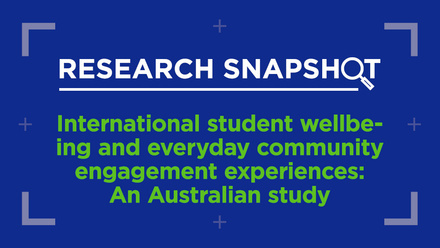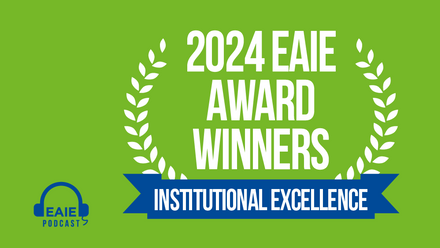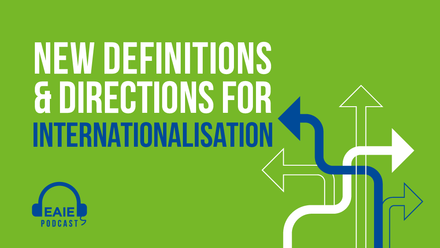Engaging communities: internationalisation of higher education for society

Community engagement is growing in importance in the internationalisation of higher education, and the Winter 2022 issue of EAIE Forum magazine takes a deeper dive into this growing phenomenon. Kicking off the launch of the latest edition of Forum, today’s blog post explores one of the crucial concepts underpinning the renewed push for community engagement: internationalisation of higher education for society, or IHES.
Practices and discourses on the internationalisation of higher education (IoHE) are mainly conceptualised in economic terms. The Australian approach is a good example of IoHE deeply marked by a commercial orientation, focusing on cross-border student mobility. Consequently, there have been calls from academia to develop new approaches to internationalisation or to become more carbon neutral. In current times, higher education faces the challenge of balancing the triad of funding, economic recession and social engagement. In this sense, IoHE activities could contribute to this goal and, at the same time, promote the common good in society through university-community engagement.
To this end, it is essential to situate universities' responsibility towards society within the internationalisation agenda. In their 2019 article, Bandenburg et al hint at the potential between the concept of internationalisation in higher education and social engagement, expanding the ways in which both activities can address social problems at local and global levels, including those identified by the United Nations, with the Sustainable Development Goals in the 2030 Agenda.
In this sense, the 2015 definition of internationalisation by De Wit et al is in line with the ideal of education proposed by UNESCO, in which education is a common good and should therefore contribute to the well-being of society.
Towards a new internationalisation of higher education
‘Internationalisation of higher education for society’ (IHES) is a proposal made in the abovementioned 2019 article published in University World News. IHES has as its explicit aim "to benefit the wider community, at home or abroad, through international or intercultural education, research, service and engagement". In this way, IHES shows the relationship between internationalisation and social engagement. The term ‘university-community engagement’, a term proposed in the European project ‘Towards an European Framework for Community Engagement in Higher Education’ (TEFCE), is an obligatory reference in the realisation of IHES. The TEFCE project proposes a broad and bidirectional involvement between the university and the community. The community is understood in a broad sense and is made up of: governmental organisations, businesses, civil society organisations and citizens. Therefore, ‘university-community engagement’ is defined as the "process by which universities engage with community stakeholders to undertake joint activities that can be mutually beneficial, even if each party benefits differently".
For this reason, it is thought that IHES can be strengthened through university-community engagement and inter-university networking. In some networks, work with the community occupies a central place. This relevance was pointed out in the University World News webinar of 29 January 2021, when Lorene Hoyt, executive director of the Talloires Network of Engaged Universities, noted that "members of the Talloires network are more interested in promoting community engagement than rankings that promote competition in higher education". Similarly, Hilligje van 't Land, secretary general of the International Association of Universities, insisted that "what is needed today is greater cooperation and working together to address the challenges we face". Community is also central to the mission of inter-university networks such as Campus Compact in the United States to promote civic and democratic values, or in Ireland with the Campus Engage network; according to the National Strategy for Higher Education to 2030, Irish universities must have an open engagement with their community and wider society and "this must infuse all aspects of their mission".
In Asia, the University Social Responsibility Network (USRN), takes the view that "University social responsibility deepens the efforts of universities to provide solutions to the economic, social and environmental problems of society". In Latin America, networks such as the Union of Latin American University Social Responsibility (URSULA) and the Association of Universities Entrusted to the Society of Jesus in Latin America (AUSJAL), adopt approaches related to the management of university impacts, the promotion of social inclusion, equity, justice and solidarity. Likewise, the NEWLEAD project created in 2020 and funded by the European Union, seeks to boost and network universities and strengthen the role related to institutional leadership to contribute to greater social inclusion, equity, gender equality and, at the same time, promote partnerships of higher education and social actors.
In this sense, inter-university networks and university-community engagement reconfigure the internationalisation of higher education by renewing its leadership in society through IHES. To this end, it is necessary to overcome the reductionist view within and outside academia that the two university activities should remain separate. In other words, it is possible to establish a healthy and active interdependence between IHES and university-community engagement. This relationship can make an important contribution to local communities and to the global common good by integrating the teleological and ethical dimension of higher education. As Ellen Hazelkorn has pointed out, internationalisation is meant to enhance international interconnectedness for the benefit of society.






